The Asian Influence in My Garden (continued)
The Evergreen Azaleas
The majority of the shrubs in my garden are evergreen azaleas,
and all of the evergreen species came originally from the
Orient. Among my favorite azaleas are some of the oldest Kurumes,
which were developed after 300 years of hybridizing in Japan on the
Island of Kyushu. Some of these plants have been introduced from
Japan several times, including the familiar "Wilson's Fifty", a
collection of Kurumes which were selected by E.H.Wilson and
introduced through the Arnold Arboretum in 1919. I particularly
enjoy the lovely soft pink of "Pink Pearl" (syn. "Azuma Kagami")
which is believed to be hybridized by a Japanese samurai, Mr.
Motozo Sakamoto, sometime in the 1800's. In the landscape, Pink
Pearl is a perfect companion with pink dogwoods and harmonizes well
with "Apple Blossom" (syn. "Ho o"), which is paler pink with
somewhat smaller flowers. A new hybrid which I particularly admire
is one by Dr. Sandra McDonald of Hampton, Virginia, called
"Dreamsicle". Its single flowers are a blend of those same warm
pink tones, but have a mottled effect reminiscent of melting ice
cream.
Warm weather is here to stay when the lavender pink azalea in my front
yard near the well is in full bloom. I think the variety might be
the Kaempferi hybrid, Gretchen , but I didn't keep name tags
when I was 5 or 6 years old. One additional thing about this azalea
is its pronounced fragrance which perfumes the entire yard for
several weeks. Many azaleas and rhododendrons are very fragrant.
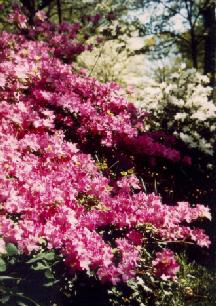
|
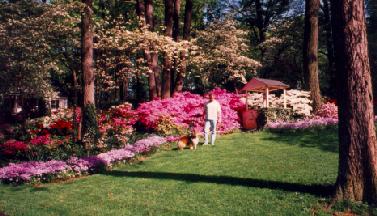
Me and my dog, Lucy, near the well house
|
|
Purple Kaempferi Azalea: Gretchen
|
|
Among the larger growers, "Magnifica", with its large fragrant
white flowers and bold red flare is a real show stopper, unless we
have a harsh winter during which it tends to lose its flower buds.
Magnifica has been listed as R. mucronatum var. "Sekidera", once
considered to be a species, but now also believed to be a hybrid
from southern Japan. A scarce and unusual mucronatum hybrid
developed by the late Roy Matlack in Arlington, Virginia, is being
distributed under the name "August to Frost". As its name implies,
this plant usually starts blooming in August and continues until
frost. Its beautiful white bloooms are are a treat in the fall
season, and it seems to be a bit late for petal blight. Another
old favorite is the fragrant lavender spider azalea, "Koromo
Shikibu", which is sometimes listed as a Kurume hybrid but is now
considered to be a hybrid of the species macrosepalum. My favorite
of the spider azaleas, though, is a Koromo Shikibu hybrid developed
by Dave Wagner in Burtonsville, Maryland, and has been distributed
under the label "Wagner's White Spider #1". "Anna Kehr" is a
beautiful double pink developed by Dr. August Kehr, past President
of the American Rhododendron Society.
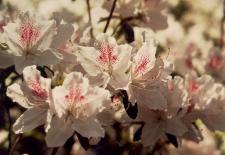
|
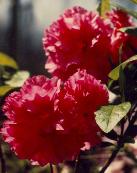
|
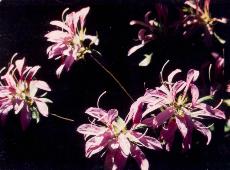
|
Magnifica
A fragrant species
|
Anna Kehr
A new double pink
|
Koromo Shikibu
A fragrant "Spider" type
|
Every spring, I look forward to the opulent display of another old
timer, "Cleopatra", a large grower with striking single flowers of
watermelon pink. Cleopatra is a hybrid of Japanese species R.
kaempferi, and after nearly forty years in my yard, required annual
pruning to keep it below the windows on second floor of the house.
However, I had to cut it back severely two years ago when I moved
the plant to make way for a new deck. I gradually worked my
Cleopatra with its enormous root ball, inch by inch across the lawn
over a period of several weeks during midsummer heat. The plant is
recovering, and so am I. Another robust favorite which will
eventually take over the rest of my back yard is the brilliant pink
Glenn Dale variety "Dream" which B.Y. Morrison, the first Director
of the National Arboretum, developed from the Chinese species, R.
simsii. An excellent companion which will hold its own against
Dream and maybe even kudzu is Joe Gable's hardy white hybrid, "Rose
Greeley". Gable developed this large flowered hose-in-hose white
after 16 years of focused hybridization using primarily the hardy
lavender Korean species, R. poukhanense. Gable had a goal, and
achieved it admirably.
Cleopatra
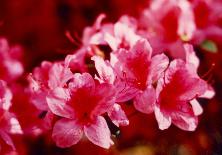
|
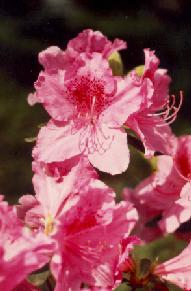
Dream, a Glen Dale Hybrid
|
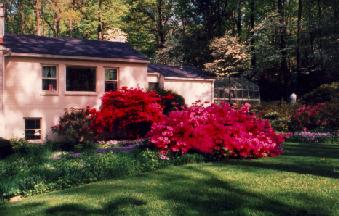
|
Dream and Cleopatra before I built the deck.
|
There are so many excellent azalea species in the evergreen
series from Japan, and some of my favorites include R. indicum
var."Balsaminaeflorum", R. kiusianum var. "Komo Kulshan", and R.
nakaharai var. "Mt. Seven Star" which have made nice pot plants and
if I were a better gardener, they might make good Bonsai subjects.
There are also numerous hybrid groups introduced from direct Asian
sources including the enormous wealth of late blooming Satsukis and
Dr. John Creech's new Kurume introductions. And of course, there
are all of those hybrid groups which we have been developing here
in the United States which are descendants of the Asian species
such as the Glenn Dales, the Back Acres like "Margaret Douglas",
the Linwoods like "Hardy Gardenia", the Robin Hills like "Nancy of
Robin Hill", the Greenwoods, the Harris hybrids, and so on. Azalea
collectors only lack one thing, space.
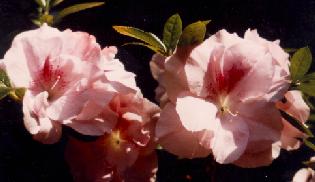
|
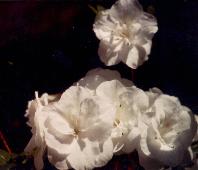
|
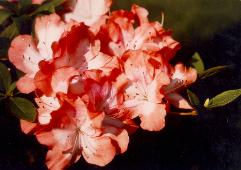
|
|
Nancy of Robin Hill
|
Hardy Gardenia
|
Margaret Douglas
|
The Asian Influence in My Garden
Directory of Pages:
- Introduction
- Asian Rhododendron Species
- Evergreen Azaleas
- Deciduous Azaleas
My General Garden Page












